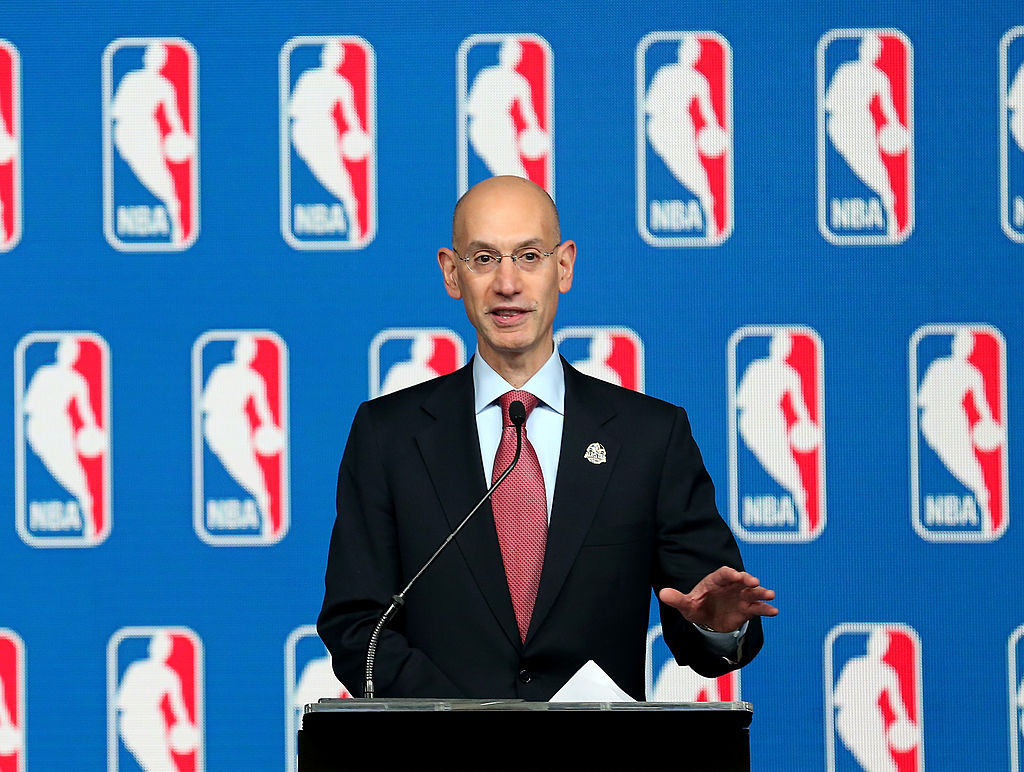Adam Silver Is on a One-Man Mission to Ruin the NBA
Adam Silver became the NBA commissioner in 2014. Since then, he has wholeheartedly embraced sports gambling while making games harder for ordinary people to watch.

When it comes to fans, it seems clear the type of community Adam Silver prefers is a gated one; the games are for the rich to watch and attend. (Christian Petersen / Getty Images)
At the National Basketball Association’s (NBA) annual board of governors meeting, the New York Times’ Tania Ganguli asked the NBA’s commissioner, Adam Silver, about the rising costs of fandom.
To anyone who enjoys attending games, his response was deeply disappointing. “There’s a huge amount of our content that people can essentially consume for free. I mean, this is very much a highlights-based sport,” he told Ganguli.
Silver made his comments in the context of a massive eleven-year, $76 billion media rights deal set to come into effect this upcoming season. The deal expands the league’s number of partnerships — now including the likes of NBCUniversal and Amazon Prime Video — and spreads more games across multiple subscription services.
This move will make it hard for many to watch the teams they support. Already, local TV blackouts, which prevent certain regions from televising games, mean that fans in areas with restrictions often must pay twice as much as those without them. As commentator Joon Lee recently lamented: “For most of my life, sports was one of the most accessible forms of entertainment in America. You turned on the TV, flipped to the game and cheered or booed — with your family, your neighborhood, your city. Being a fan was simple. It was community.”
When it comes to fans, it seems clear the type of community Silver prefers is a gated one. The games are for the rich to watch and attend, and the rest of us should be happy with YouTube compilations.
Coinciding with the NBA’s shift to a viral clip highlight league has been its embrace of sports gambling, spearheaded by Silver. During the commissioner’s tenure, multiple gambling scandals involving players and officials have broken out — ironic, given Silver himself was instrumental in bringing sports betting into the mainstream. In 2014, he wrote an op-ed for the New York Times arguing in favor of the legalization of sports betting, the only active major US sports league commissioner to do so at the time.
Sports gambling was effectively legalized less than four years after Silver’s op-ed. The league has since partnered with online betting platforms FanDuel and DraftKings. These two industry titans account for roughly two-thirds of the US betting market and were previously blocked from a planned merger by the Federal Trade Commission on grounds of potential monopoly status.
The widespread acceptance and promotion of these betting platforms by the NBA has unsurprisingly compromised the positions of players, coaches, executives, and even stadium staff. In 2024, Toronto Raptors forward Jontay Porter was banned from the league for life after he was found to be actively manipulating prop bets with his on-court play. Another investigation remains open involving suspicious betting action from Miami Heat guard Terry Rozier.
Gambling has been bad for fans too. Recent studies show that in states where gambling has been legalized, household savings and aggregate credit scores have decreased, while the amount of credit card debt, overdraft fees, and bankruptcies has increased. It isn’t a stretch to say that legalized gambling may in fact function as simply an indirect regressive tax on the poor.
A recent poll conducted by the Athletic found that a clear plurality of NBA players felt gambling was bad for the league. To quote one anonymous player: “It’s a little unsettling to me. . . . I get 10 messages, DMs a game, ‘F*ck you, I’m gonna f*ck your family up.’”
This general culture of corruption has extended to the way that executives manage players, coming to a head in a recent controversy that has shocked the league. According to reporting from the podcast Pablo Torre Finds Out, the Los Angeles Clippers may have attempted to pull off the largest salary cap circumvention scheme in the history of American professional sports — led by, perhaps not coincidentally, the richest owner in the history of American professional sports: former Microsoft executive Steve Ballmer.
The salary cap exists in most professional sports in the United States as a mechanism meant to ensure a requisite amount of parity between both bigger- and smaller-market franchises, and their wealthy and less-wealthy ownership groups. Ballmer is alleged to have signed star forward Kawhi Leonard to a no-show endorsement deal with the fraudulent green fintech Aspiration — a now-bankrupt shell entity the franchise used to pay Leonard more than was legally permitted under league rules.
Silver’s actions violate the most basic tenets of what sports are meant to undergird. A societal staple representing leisure, meritocracy, and community is increasingly becoming one of our most explicit examples of exploitation, corruption, and isolation. Silver is selling out the sport, and its fanbase, in order to prioritize a short-term profit maximization model. His blinkered notions of what make sports compelling and what fosters true fan connection damages both the sport and fan alike — whether it be through the slow degradation of one of our greatest forms of live entertainment or the vampiric posture assumed toward its most dedicated and loyal supporters.